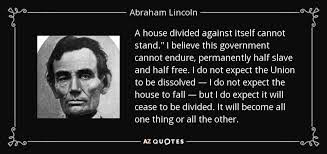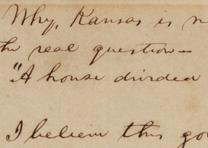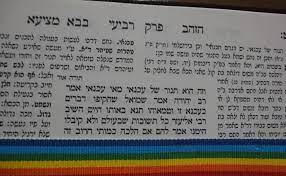from Abraham Avinu to Abraham L . . . .
Merely a disagreement or possibly, ‘a house divided’
While not exactly gospel, still, let’s take this seriously . .


From this week’s section, Parsha: Deuteronomy 10:20
אֶת־יְהֹוָ֧ה אֱלֹהֶ֛יךָ תִּירָ֖א אֹת֣וֹ תַעֲבֹ֑ד וּב֣וֹ תִדְבָּ֔ק וּבִשְׁמ֖וֹ תִּשָּׁבֵֽעַ׃
You must revere יהוה: only your God shall you worship, to [God] shall you hold fast, and by God’s name shall you swear.

______________
I have selected a story (pictured above and copied below towards the bottom of this page) from the Talmud. And yes, I know, not everyone has a stomach for a Talmudic discourse, but it can at times help us understand how Jewish civilization (outside of its homeland, under the domination of foriegn regimes and the so-called civilizations of Europe and North Africa), how we, (given these realities), were able to come to terms with our law and commandments, (not easily).
Importantly, it might help us to understand that law is not simply that which is understood as only majority rule. At times, the law should (must) take into consideration the idea of living with the law, what we might call ‘acceptance . . . ‘
Dangerous as it may be, we Americans and even our Israeli friends, are at times confronted by a phenonmenon referred to as ‘the tyranny of the majority’ — which can be especially threatening in a ‘democracy’ in which a majority (perhaps razor thin) comes to lord over over ‘the rights’ of others (even citing a mandate to do so).
This particular piece of law and tradition is often at the very heart of discussion among those who, on the one hand consider themselves individually righteous (i.e. zealous, feeling that everyone and everything should or is on their side) and those, on the other hand, who are mindful of the rights of the community as a whole, or in other words, to all “the inhabitants thereof . . . ”
Only read this if you are not easily frustrated (and/or annoyed) by Talmudic debate (or as some would say, frustrated by the mere appearance of ‘quibbling over seemingly nothing’).
________________
This is from the Gemara / (or) the Talmud: the Oven of Akhnai.
The Gemara asks: ^ What is the relevance of akhnai, in this context?
The Sages taught: On the day they discussed this matter, Rabbi Eliezer answered all possible answers to support his opinion, but the majority of Rabbis did not accept his explanations from him.
אמר להם אם הלכה כמותי חרוב זה יוכיח נעקר חרוב ממקומו מאה אמה ואמרי לה ארבע מאות אמה אמרו לו אין מביאין ראיה מן החרוב חזר ואמר להם אם הלכה כמותי אמת המים יוכיחו חזרו אמת המים לאחוריהם אמרו לו אין מביאין ראיה מאמת המים
After failing to convince the Rabbis logically,
- Rabbi Eliezer said to them: If Jewish Law is in accordance with my opinion, this carob tree will prove it. The carob tree was uprooted from its place one hundred cubits, and some say four hundred cubits. The Rabbis said to him: One does not cite halakhic proof from the carob tree.
- Rabbi Eliezer then said to them: If the halakha is in accordance with my opinion, the stream will prove it. The water in the stream turned backward and began flowing in the opposite direction. They said to him: One does not cite halakhic proof from a stream.
חזר ואמר להם אם הלכה כמותי כותלי בית המדרש יוכיחו הטו כותלי בית המדרש ליפול גער בהם רבי יהושע אמר להם אם תלמידי חכמים מנצחים זה את זה בהלכה אתם מה טיבכם לא נפלו מפני כבודו של רבי יהושע ולא זקפו מפני כבודו של ר”א ועדיין מטין ועומדין - Rabbi Eliezer then said to them: If the halakha is in accordance with my opinion, the walls of the study hall will prove it. The walls of the study hall leaned inward and began to fall.
- Rabbi Yehoshua scolded the walls and said to them: If Torah scholars are contending with each other in matters of halakha, what is the nature of your involvement in this dispute?
- (The Gemara relates: The walls did not fall because of the deference due Rabbi Yehoshua, but they did not straighten because of the deference due Rabbi Eliezer, and they still remain leaning).
חזר ואמר להם אם הלכה כמותי מן השמים יוכיחו יצאתה בת קול ואמרה מה לכם אצל ר”א שהלכה כמותו בכ”מ - Rabbi Eliezer then said to them: If the halakha is in accordance with my opinion, Heaven (i.e. Gd) will prove it.
- * A Divine Voice emerged (Gd) from Heaven and said: Why are you differing with Rabbi Eliezer, as the halakha is in accordance with his opinion in every place that he expresses an opinion?
Bottom line:
- Years after, Rabbi Natan encountered Elijah the prophet and said to him: What did the Holy One, Blessed be He, do (or say) at that time, when Rabbi Yehoshua issued his declaration?
- Elijah said to him: The Holy One, Blessed be He, smiled and said: My children have triumphed over Me; My children have triumphed over Me.
_______________
